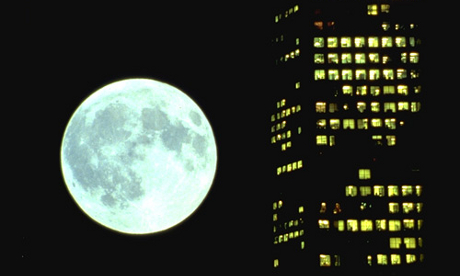Director: Mathieu Roy, Harold Crooks
Writer: Harold Crooks, Mathieu Roy
Year: 2011
Cast: Ronald Wright, David Suzuki, Vaclav Smil
★★★★☆
The most worrying thing about documentaries like Surviving Progress is that they are not only still relevant, but more relevant than ever. There is an overwhelming sense that we should know this stuff already. Yet, here we are, thirty years down the line from Koyaanisqatsi, and we appear to have learned very little, apart from the enduring effectiveness of time-lapse photography. We still consume too much, we are still driven by unquenchable material desires and we are still unable to grasp the bigger picture. Far from being addressed, these problems are escalating. Life is increasingly out of balance.
However, this documentary, co-directed by Harold Crooks and Mathieu Roy, does not simply set out to cover old ground. Instead, it approaches the problem from a different angle, incorporating and centralising the most devastating implications of the 2008 financial crisis. The film’s essential thesis is that the global economy is constructed on unsustainable levels of debt, all of which is essentially owed to those at the very top of the financial ladder – the 1% to use contemporary terminology. Creditors must be paid, which means debtors are forced to exploit every resource at their disposal, until there are no resources left.

One of the title frames terms this process “digging holes”, which is a succinct way of putting it. The clearest example comes from the deforestation of the Amazon rainforest. The narrative goes that during the 1970s, Brazil accumulates debt that it is unable to pay off using conventional methods. It is encouraged to turn to natural sources of wealth, particularly the untapped rainforest. The devastation will have no impact on foreign creditors – to them, it is just like any other asset on Brazil’s balance sheet. If and when it is exhausted, there are plenty of other holes to dig. However, it is not simply a matter of foreign exploitation, as local people are complicit in the destruction. But they too have debts to pay. It is hard not to sympathise with the loggers who are prepared to break conservation laws to stay in business. Deforestation is the local economy – without it, people will starve.
“Conventional economics,” proclaims environmentalist David Suzuki, “is a form of brain damage” and it is difficult in this context to argue with him. By externalising reality, the discipline becomes little more than a systematic fantasy. Humanity’s collective debt cannot be self-contained; it cannot flow harmlessly between individuals, corporations and nations. Inevitably, it must spill over into the natural world. And if our debt to the planet becomes irrevocable, no amount of Wall Street wizardry is going to prevent a catastrophe.
Surviving Progress makes this point effectively, drawing on the ideas of a range of interesting contributors, including Jane Goodall, Stephen Hawking and Ronald Wright, who wrote the book the film was based on. Its scope is impressive, incorporating history, politics, science and economics, but, ultimately, it fails when it comes to putting forward solutions. The problem, as Wright acknowledges, is that nobody wants to talk about the realities of doing what needs to be done. Synthetic biology and space exploration are put forward as viable alternatives, but practically they only represent further holes. Vaclav Smil is the most impressive speaker in this regard, distinguished by his ability to get to the point, albeit after an amusing digression on $50,000 bathrooms. We must consume less. We have to balance the books before it is too late.

Image from Koyaanisqatsi
The terrifying problem lingering below the documentary’s surface is that progress has become self-perpetuating. There is no logical get out, which means we are no longer in charge of our own destiny. Globalisation has left us with a single socio-economic reality that we are unable to transform without devastating consequences. It is easy to say we must consume less, but who is doing it and how on earth could they?
I have not discussed the film in great detail because the ideas are more important. It is entertaining, well-directed and suitably but not overly derivative of Koyaanisqatsi. There are some beautiful shots, especially of Sao Paulo. And what is it about time-lapse that lends itself so well to this kind of film? It is able to show humanity in the macrocosm. It effortlessly renders us absurd.
Surviving Progress was screened as part of the 2012 Take One Action film festival in Edinburgh and Glasgow.